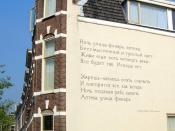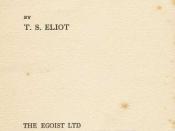The Love Song of J. Alfred Prufrock" is not a poem about love, at least in any traditional sense. Rather it is a collection of the fragmented thoughts of a hyperconscious man. Far from being about love, it is about one man's inability to love (himself or the world around him.) It is the cynical statement of a man who does not believe good things will ever happen to him, or that the world has anything to offer him. His own life is devoid of love, so in his bitterness he brands his work a "love song".
The Poem begins with an invitation from Prufrock to follow him through his self-examination. The imagery of this invitation begins with a startling simile, "Let us go then you and I; When the evening is spread out against the sky; Like a patient etherised upon a table." This simile literally describes the evening sky, but functions on another level.
Prufrock's description of the "etherised? evening indicates an altering of perception, and an altering of time, which creates a dreamlike quality throughout the poem. This dreamlike quality is supported throughout the poem with the "yellow fog" that contributes to the slowed-down-etherised feeling of the poem. Time and perception are effectively "etherised" in this poem. It is almost as if the poem is a suspended moment of realization of one man's life, "spread out against the sky". The imagery of the patient represents Prufrock's self-examination. Furthermore, the imagery of the "etherised patient" denotes a person waiting for treatment. It seems this treatment will be Prufrock's examination of himself and his life.
Prufrock repeats his invitation and asks the reader to follow him through a cold and lonely setting that seems to be the Prufrock's domain. The imagery of the journey through the city is...


